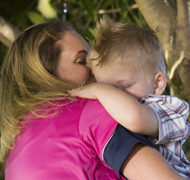Parenting Children, Part 2
Blog / Produced by The High Calling
This two-part series highlights advice from Sharon and Terry Hargrave. Sharon Hargrave is the Director of the Boone Center for the Family at Pepperdine University, and the Director of Strong Marriages/Successful Ministries at Fuller Seminary.Terry Hargrave, PhD, is a Professor of Marriage and Family Therapy at Fuller Seminary and is president and in practice at Amarillo Family Institute, Inc.
"Mama, did you know what happened in Boston?" my first-grader asks me after school one day.
"I did, honey. Tell me about what you heard." She pops goldfish into her mouth with tiny hands, and tells me more facts than I would have shared with her. She pauses for a sip of chocolate milk, and then asks me why anyone would want to do such a terrible thing. My heart aches for another piece of innocence stolen away too soon. I look into her questioning eyes, and I don't have an answer.
We've had countless discussions like these over the past couple years, from NICU babies to friends with cancer, from destruction by natural disaster to devastation by human hands. I often feel like these conversations are coming at me faster and faster, perhaps because she's growing more aware of the world around her and perhaps because these occurrences seem to happen more often. My inner mama bear comes out growling, ready to protect my girls from the big, bad world outside our cave.
A discussion I had with Sharon and Terry Hargrave comes back to me. They had been talking with me about the idea of seeing difficulties in life as opportunities to make emotional connections and shape spiritual formation. They said, "The reality of today is that scary things happen in our world. Places we used to feel were safe, we now worry about. So as a parent am I going to help my children navigate the fears of life in addition to the good things?"
Navigating life—positive as well as fearful events—feels so different now than when I was a child.
"Mama, you've told me that when you were my age, you used to go play in the neighborhood and not come back until lunch or dinner. Why don't you trust me to do that?"
"Oh, honey, it's not that I don't trust you. Mommy grew up in a small town. We live in a really large city, and it's not safe for you to do that."
"So I'm stuck in the house or the backyard? I'll be fine, I promise!"
"I want to believe that, and I think by and large you would be fine. But there are lots of people out there who might hurt you, and I can't take the risk of that happening."
How do I as a parent find the balance between protecting my girls and teaching them how to navigate the fears of life?
The Hargraves continued, "We can leave our children in a place of fear, or we can discuss the question of how we as a family are going to move forward in spite of that. In having these conversations, we teach our children that there can be more than one solution to a problem. We can remind them that as Christians, God doesn't promise that we won't face difficult things in life. We have the opportunity to reinforce the truth that God is with us when things are good, as well as when they aren't. We can model how to handle fears in a healthy manner."
My head was whirling. Most of the time I view difficult conversations, as, well, difficult. And here the Hargraves were encouraging me to see them as opportunities. Character is most often built through facing adversity, and as a parent of young children, I want to be laying a firm foundation now.
In both conversations with my daughter, I had left her in a place of fear, rather than helping her process all the way through. I considered how I could return to her to finish the conversation. We could talk about what we would do if we ever found ourselves in a dangerous situation like the events at the Boston Marathon. We could brainstorm ways that she could explore our neighborhood—riding her bike down the street where I can still see her but she also has some freedom, or going on exploratory adventures together as a family.
While my natural instinct is to shelter my children from dealing with any sort of fear, I can see that in the long run, walking them through dealing with those fears is far better. At some point in their lives, they will face fears. I can't prevent it forever, but I can equip them so they are ready.
- Read Parenting Children, Pt. 1
- Read about Bulldozer Parenting in a Q&A with the Hargraves
- Read about Parenting in the Face of Fear, a Q&A with the Hargraves
Image by Tim Miller. Used with permission. Post by Laity Lodge Family Camp editor Tina Howard.





